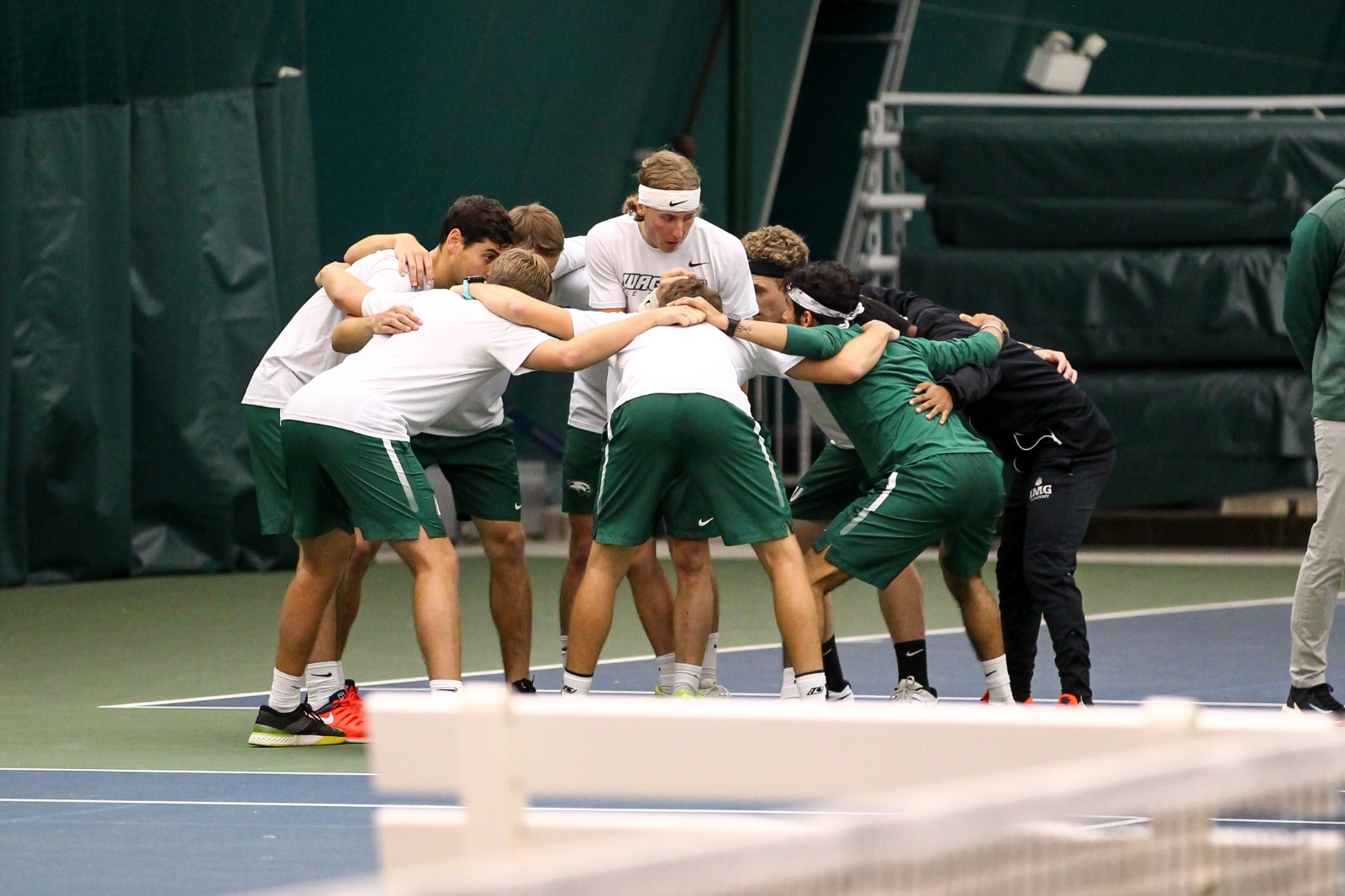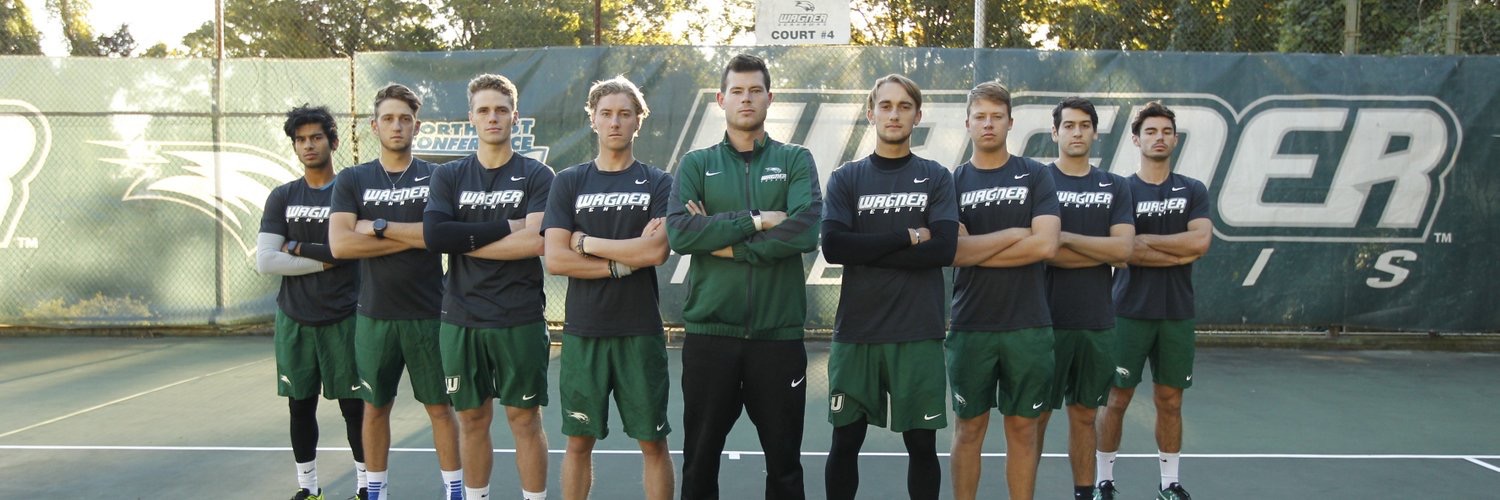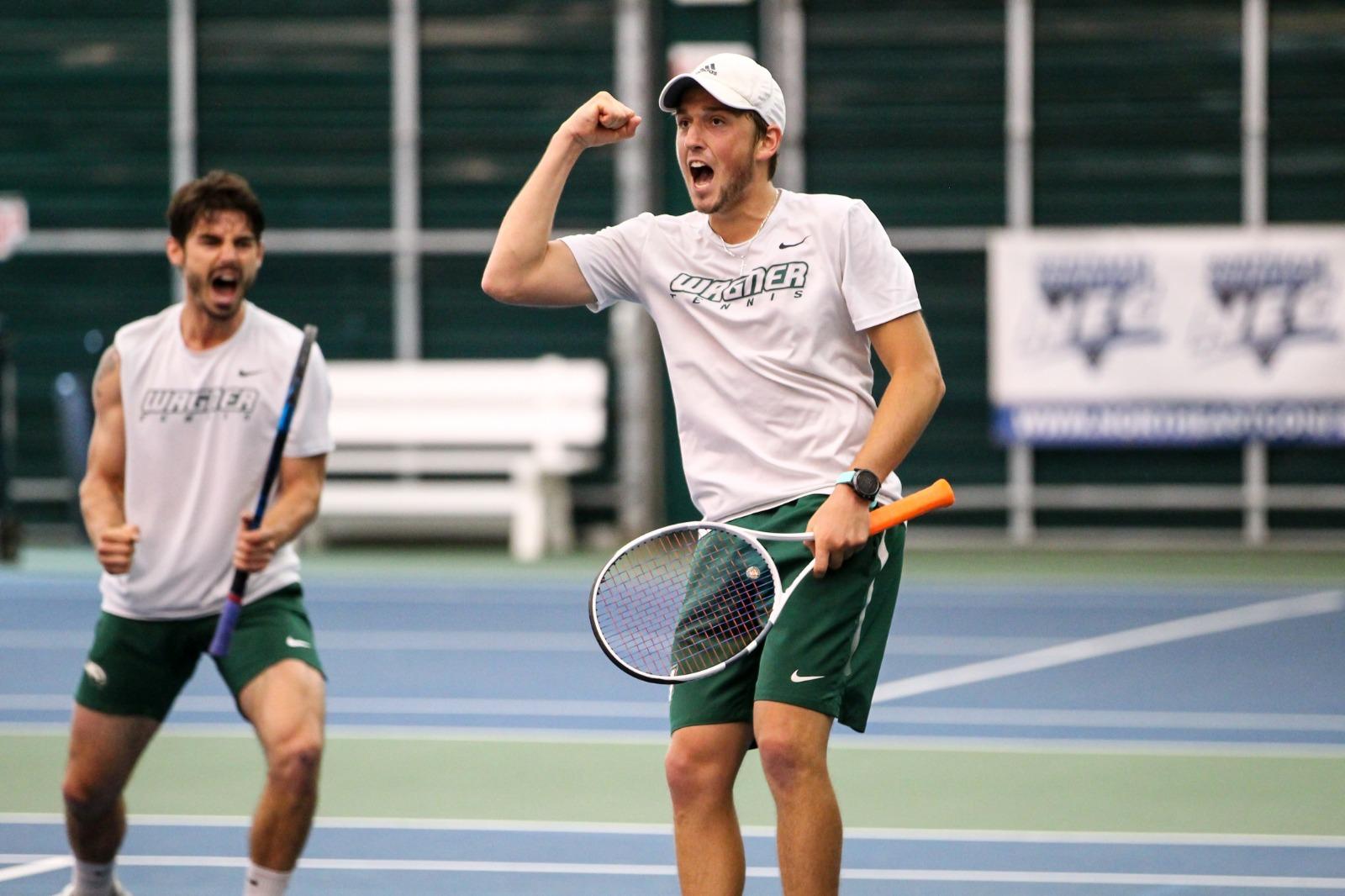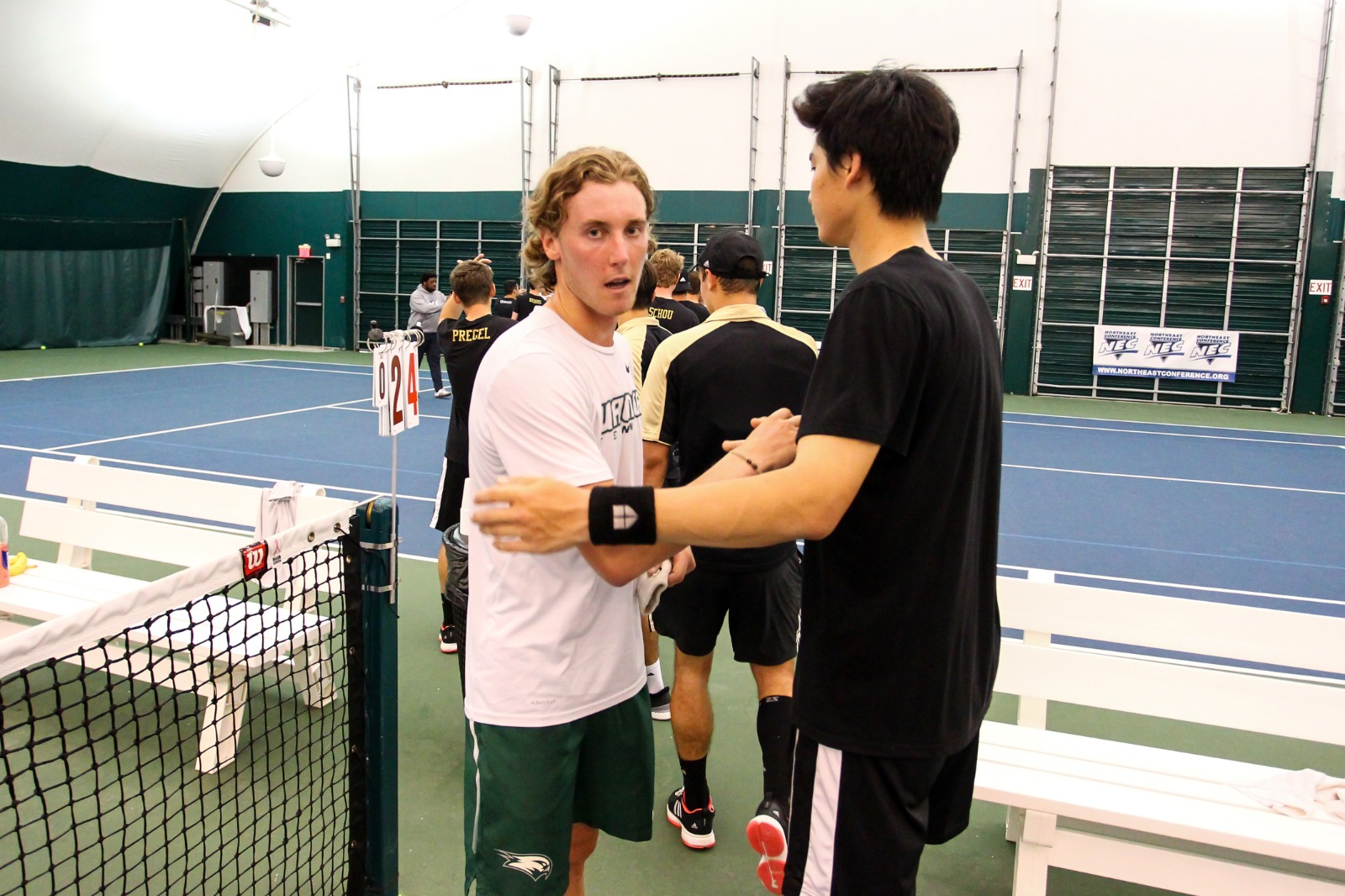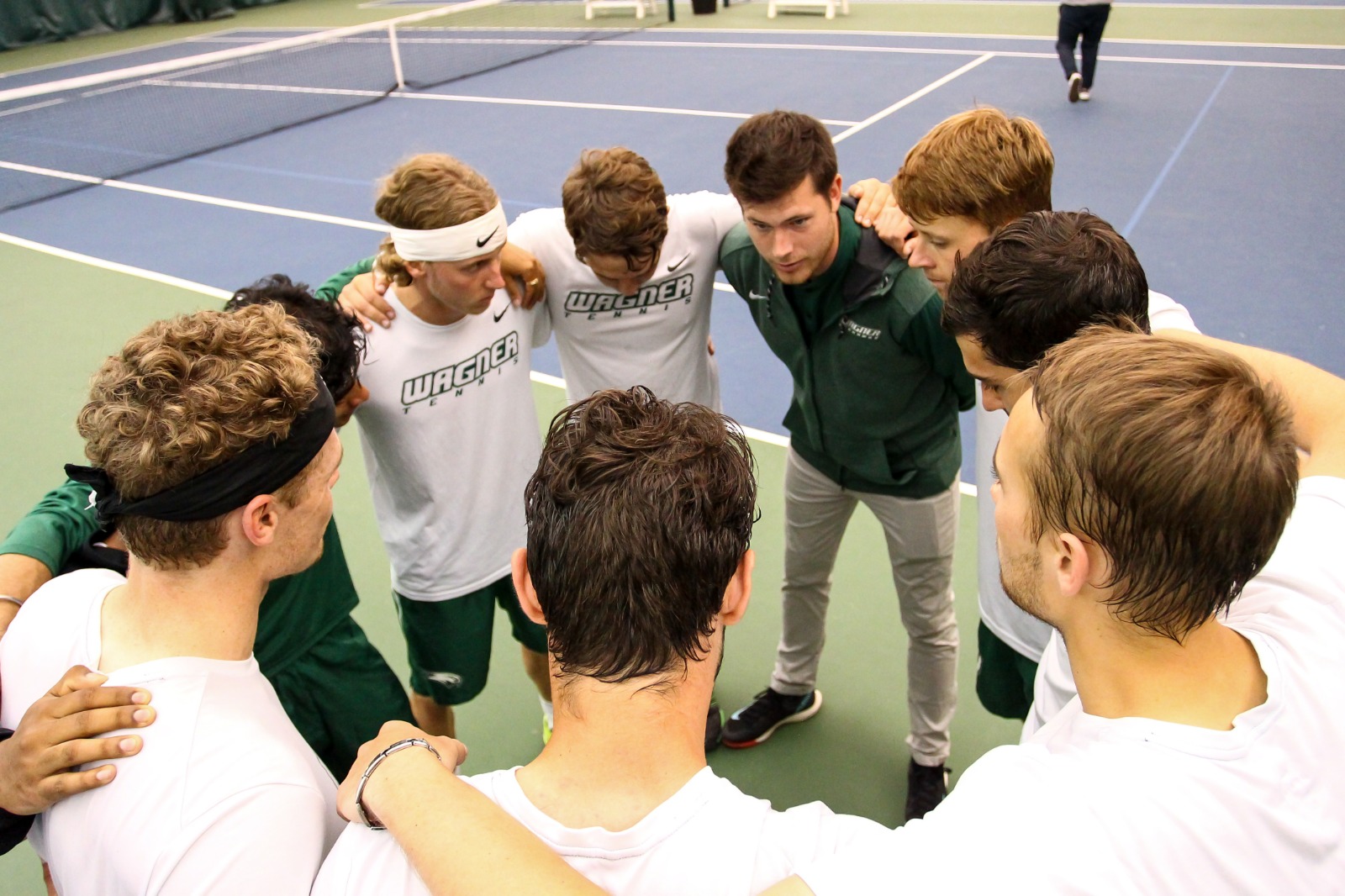Ilya Kneppelhout, former college tennis player at Wagner College, shares his experience in college tennis with us. He can easily name several reasons on why he prefers college tennis over ‘reguler tennis’, which he will do in this article. But first, he wants to take us back to April 20 and 21 in 2019. These are one of the greatest days during his student-athlete career and his story will definitely help you understand college tennis better. Keep reading and… goosebumps guaranteed!
April 20, 2019. The nerves are racing through my body. My opponent, who I can’t stand out, walks to the baseline and is ready to serve. I wipe the sweat from my face and hear my teammates screaming. All I can hear is “Let’s GOOO Seahaaaawkkss” and “It’s KitKat Timmmmeeeee boooyysss.” KitKat because I’m about to break my opponent’s serve: “Have a break, have a KitKat.” But not just any service break.
My team is leading 3-2 in total in games and my teammate on the track next to me is losing. This means that it all comes to my match now. I am leading, the score: 7-6 / 5-3 / 40-15. Matchpoint. If I win, we’ll be through to the ‘Northeast Conference (NEC) finals,’ only for the second time in my university’s history, Wagner College, where I played tennis and studied for the last four years. This is what my teammates and I have worked for so long, day in and day out. And that’s exactly what I’m telling myself, “This is what you worked for and suffered for. This is your moment.” I stare at my opponent one more time, hoping to intimidate him, and pray for a double fault.
He hits his first serve (sh*t) and walks up to the net. My return falls low on his feet, he picks it up nicely, but his volley flies out two inches. I have no idea what I’m doing, but I scream, make a few awkward moves, and then see my teammates running towards me. They hug me, hit me on my A$$, and smile from ear to ear. I did it. No, it’s college tennis: WE did it. The Seahawks are through to the NEC finals and we will face our biggest rival tomorrow: Bryant University.
April 21, 2019: It is 7:30 AM. My coach, my teammates and I are sitting at our round breakfast table in the hotel. Bryant’s team is across from us at another table. We all feel the tension. We all try our best to appear dangerous and confident, but we can’t hide our nerves. Today is the day. It’s them, or us. Only one team will win, take home the ‘championship rings’ and qualify for the NCAA national tournament – the ultimate goal for any college team.
Once arrived at the club we hear that all matches are played indoors due to the weather. The more fans arrive, the more exciting it gets. The encouragements, already during the warm-up, echo across all six courts. We cannot wait to start the matches. As captain I speak to my team one last time: “This is it, boys. I want to hear you from court 1 to court 6. Loud when you win, louder when you lose. Play to win. Play big. Play with your heart. Play with your soul “We form a closed circle, arms around each other, screaming the loudest yell of the entire season, the loudest of my four years on Wagner.
We lose the important double point and get together with the team before the six singles matches start. Our best player, normally a quiet boy from Ukraine, amazes everyone by addressing the team. “We can f*cking do this,” he says. This gives us energy. The six single players go to their courts. Six matches at the same time. The atmosphere is crazy. It’s not just a match between us and our opponents – the fans have a head-to-head battle as well about who can make the most noise. They all scream so loud that they are losing their voices. I am completely in the game, full focus, but I cannot deny that I occasionally look to the side and fully enjoy the atmosphere in this tennis hall. I’ve never experienced anything like this in 14 years of tennis.
But it doesn’t matter anymore. We have already lost before I even get to finish my match. Our dream of winning the NEC tournament is over. I quickly shake hands with my opponent and run to my teammates, eight guys who have become my best friends – my brothers – over the past four years. We are all close together in a circle. Quiet. Tears run down our cheeks. We put our arms around each other, and there we are: nine boys in their twenties, some of them crying. I realize that my college tennis career in the USA is over, an empty feeling, but what dominates is pride.
Proud of my team and the struggle we have fought. We shout out our yell one last time, receive the prize and get back to our university. I sit in the front, next to my coach, who turns up the radio volume. We play some throwback songs, sing (out of tune just like Madonna), and slowly become the good-humored team that we always are. We lost, but tonight it’s time for a party.
A painful memory, yet one of the best of my four years of college tennis. The sense of brotherhood and belonging is something only college student-athletes understand – it is difficult to understand. It’s been a year since I graduated from Wagner College (New York City), and I have to admit I miss this college tennis adventure. Here are five reasons why I like college tennis more than ‘regular’ tennis.
1. Team Spirit
Tennis is an individual sport, but college tennis is not. It has the best of both worlds – you’re on the track alone, but you’re never alone. After my first year in the USA I came back to the Netherlands and trained with the academy where I trained for years before I left. It was very quiet, the boys and girls were constantly getting angry with themselves, and everyone wanted to be better than others. I saw a group of individuals running around who didn’t realize that not themselves, but their training buddies make them better.
In college tennis things are different. You represent your university and therefore not only play for yourself, but also for your teammates. You train together every day, eat together, live together, travel to tournaments together, and pursue certain goals as a group, together. My teammates have become my best friends with whom I did everything and shared everything. I realize very well that I depended on them to get the most out of myself as a player and as a person. When I had a difficult day, a teammate came up to me, encouraged me, and reminded me of what we worked so hard for. We had to deal with setbacks together and celebrated and cheered together. The result was a sense of belonging and brotherhood throughout my college tennis career that is indescribable and that I will always cherish.
2. Ambiance
Tennis is known as a ‘gentlemen’s sport’, meaning little commotion and wild applause after an incredible point only. But “quiet please” is not something a referee will say in college tennis. In college tennis, fans don’t just move their heads from side to side – they also move their lips. Often. Even before the games start – during the warm-up and after the team yell – you can hear encouraging screams. And then during the match: almost after every point, the fans screech to energize and energize their team.
Until 2018, fans were even allowed to cheer on their team between the first and second service, but fortunately that is no longer allowed (if this happens, the player will receive a penalty). But the atmosphere is still amazing. Six games are played simultaneously, so a lot is happening. During these matches it is normal for the teammates to let others know that they are doing well. Not only by shouting “Come ooooh” and “Vamooosss”, but also by shouting “Break on 1 booyyssss” after a service break. This is a way to keep the energy level high and give teammates who are struggling a helping hand. As a team captain during my senior year, my coach often came to me – he asked me to ‘boost the boys’. “Add some spice,” he would say, “you are silent mice compared to your opponents. Don’t let them run over you.”
3. Rivalry
Before I left for the US there were guys I absolutely wanted to beat. But that wasn’t my only motivation. During my four years as a student-athlete, Bryant University has won the NEC Championship every year. So they were clearly our biggest rival. And I have to say that sometimes the only thing that got me out of bed early in the morning was my will to beat them. If one of my teammates had bad training or was not well on track mentally, we reminded him that his behavior diminished our chances of beating Bryant. Within seconds, his shoulders were up again and we could see the fire in his eyes again.
Besides motivating us, this rivalry was also great fun. Having a common enemy created unity in the team and very intense matches, full of enthusiastic fans (and sometimes some trash-talking to the opponents, which I secretly loved at times). Unfortunately we never beat Bryant, but playing against them gave me a feeling that I have never experienced before in the Netherlands.
4. Counting
The scoring in college tennis is different from regular tennis. The rules vary by NCAA division. In Division 1, in which I played, there is a total of seven points to be divided between the two university teams.
The first point is the ‘doubles point’. Three double matches are played at the same time, the team that wins (at least) two doubles earns the all-important double point – a big advantage for the start of the singles matches. A double match is only one set up to 6 games – this makes the game exciting from the very beginning because every point counts. There is an intense atmosphere from the first point, which makes it never boring – neither for the players nor the fans.
The six singles are played in the regular ‘best of three sets’ format. Just like during the doubles, at 40-40 the decisive point is played. Also, play continues with a net service. Typically American: drama and entertainment. Even though I had to get used to these rules as a freshman – I hated playing the decisive point on deuce – I have grown to love them. At deuce, my teammates and I were always shouting “Deeeuuuucceeee Pooooiinntt” to intimidate our opponents and boost ourselves for the crucial point. It was interesting to see that the better team won almost all the decisive points. This scoring has taught me how to gain importance and play continues on a net service. College tennis made me a lot stronger mentally, and the games were a lot more fun to play.
5. Coaching & the support team
Everyone knows that tennis is a very expensive sport, especially if you play at a high level. Only the lucky few have the resources for a full-time coach. That is different in college tennis. At Wagner College, a small Division 1 university, I had full-time access to a tennis coach, a strength and fitness coach, physiotherapists, a dietician and a sports psychologist. Teams at other universities often have more than one tennis coach, so there is only one coach on four players.
Not even the best tennis players have such an extensive team behind them. This made me feel very appreciated and allowed me to get the most out of my tennis in every way: technical, tactical, mental and physical. If I thought I needed private training all I had to do was send a message to my coach, and half an hour later I was on the track sweating. And if I had an injury, I walked five minutes to the sports and health center to be treated. These were privileges I wouldn’t have as a non-college tennis player.
Finally, I thought it was a great advantage that on-court coaching is allowed. Coaches may give their players tips and advice after each point. Although I think the great thing about tennis is that you have to find solutions yourself, this taught me how to act in certain situations. The aim of college tennis is to develop players so that they can enter the ‘real’ (tennis) world without any problems after four years. And I certainly feel that the coaches have prepared me for that.
Ilya had the time of his life during his college tennis career. Do you want to become a student-athlete as well? Reach out and we will help you!


